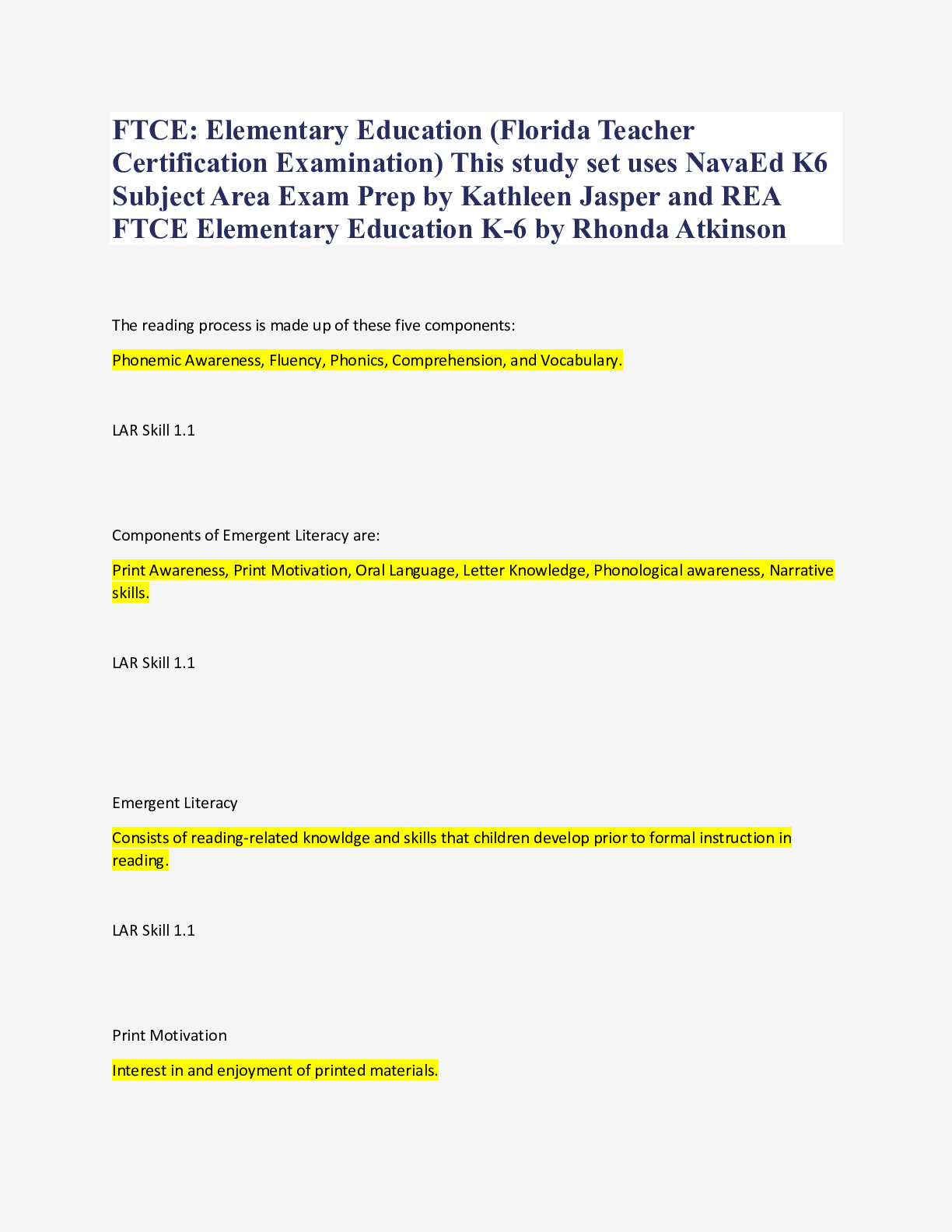Education > EXAM > EDUC 750 Quiz 1 2 versions (GRADED A) Questions and Answers | 100% correct answers (All)
EDUC 750 Quiz 1 2 versions (GRADED A) Questions and Answers | 100% correct answers
Document Content and Description Below
QUIZ 1 EDUC 750 The increasing influence of interpretivist approaches on educational research is referred to as: Selected Answer: the interpretive turn. • Question 2 What is the... research focus of this chapter? 3 out of 3 points Selected Answer: Understanding early childhood influences • Question 3 Educational research begins with questions. 3 out of 3 points Selected Answer: Tru e • Question 4 Educational research relies on thinking. 3 out of 3 points Selected Answer: analyti cal • Question 5 The term “educational world” means the educational experiences of: 3 out of 3 points Selected Answer: other people and ourselves. • Question 6 3 out of 3 points Triangulation implies that viewing a situation from different perspectives will help the researcher gain a clearer picture of the educational situation being studied. Selected Answer: Tru e • Question 7 3 out of 3 points Ms. Lake has been teaching first grade for four years. Each year, she has found that many of her curly-haired students are shy. Therefore, she has concluded that all children with curly hair are shy. She is displaying an error of: Selected overgeneraliza Answer: tion. • Question 8 Which of the following is NOT a motive for quantitative research methods? 3 out of 3 points Selected Answer: Explorati on • Question 9 3 out of 3 points Which aspect of a research proposal involves reviewing the weaknesses of the proposed research? Selected Answer: Statement of limitations • Question 10 3 out of 3 points Our questions about various research topics are answered by educational theory. Selected Answer: Fals e • Question 11 3 out of 3 points Researchers who do not accept validity as the goal for research often seek as an alternative research goal. Selected Answer: authenti city • Question 12 Quantitative methods often use inductive reasoning. 3 out of 3 points Selected Answer: Fals e • Question 13 3 out of 3 points Qualitative researchers often employ an inductive reasoning process; however, a deductive reasoning process can be used within a qualitative study. Selected Answer: Tru e • Question 14 3 out of 3 points A researcher using a quantitative approach begins with a specific question in mind that carries through the research process. Selected Answer: Tru e • Question 15 3 out of 3 points Quantitative methods often use reasoning while qualitative research methods often use reasoning. Selected Answer: deductive; inductive • Question 16 3 out of 3 points An educational research question may be answered through the of empirical data. Selected Answer: collection and analysis • Question 17 The goal of validity is the pursuit of impartial knowledge. 3 out of 3 points Selected Answer: Tru e • Question 18 3 out of 3 points Standards for Educational and Psychological Testing is a book about ethics published by the American Psychological Association. Selected Answer: Fals e • Question 19 3 out of 3 points Which one of the following subjects would be most likely to be given special protection for informed consent? Selected Answer: A prisoner serving time in a state correctional facility for sexual assault. • Question 20 3 out of 3 points In her 2009 school-based interview study, how did graduate student Esta Montano maintain her subjects' privacy and confidentiality? Selected Answer: She employed a proxy to interview subjects she had previously taught. • Question 21 3 out of 3 points Which U. S. human rights violation prompted the need for the protection of research subjects? Selected Answer: Tuskegee Syphilis Study • Question 22 Which agency monitors IRBs when a research study involves drugs? 3 out of 3 points Selected Answer: Federal Food and Drug Administration • Question 23 3 out of 3 points A certificate of confidentiality legally protects researchers from disclosing confidential information. Selected Answer: Tru e • Question 24 3 out of 3 points The 1979 Belmont Report established three basic principles for the protection of human subjects. What were these principles? Selected Answer: Respect for subjects, beneficence, and justice • Question 25 3 out of 3 points and are two levels of protection provided for children who participate in research. Selected Answer: Consent and assent [Show More]
Last updated: 2 years ago
Preview 1 out of 4 pages

Buy this document to get the full access instantly
Instant Download Access after purchase
Buy NowInstant download
We Accept:

Reviews( 0 )
$8.00
Can't find what you want? Try our AI powered Search
Document information
Connected school, study & course
About the document
Uploaded On
Oct 27, 2022
Number of pages
4
Written in
Additional information
This document has been written for:
Uploaded
Oct 27, 2022
Downloads
0
Views
150





 Questions and Answers 100% VERIFIED.png)
 Questions and Answers 100% correct Solutions.png)



















